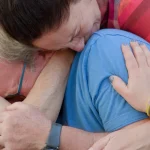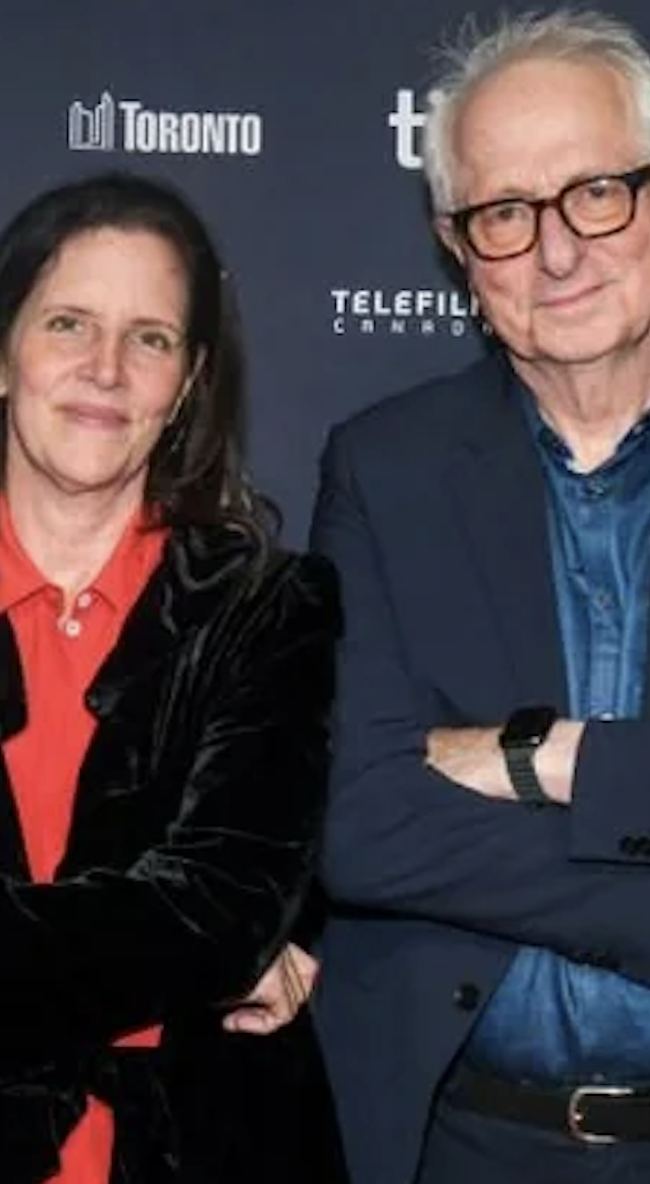A Conversation with Billy Corben (CANCELED: THE PAULA DEEN STORY)
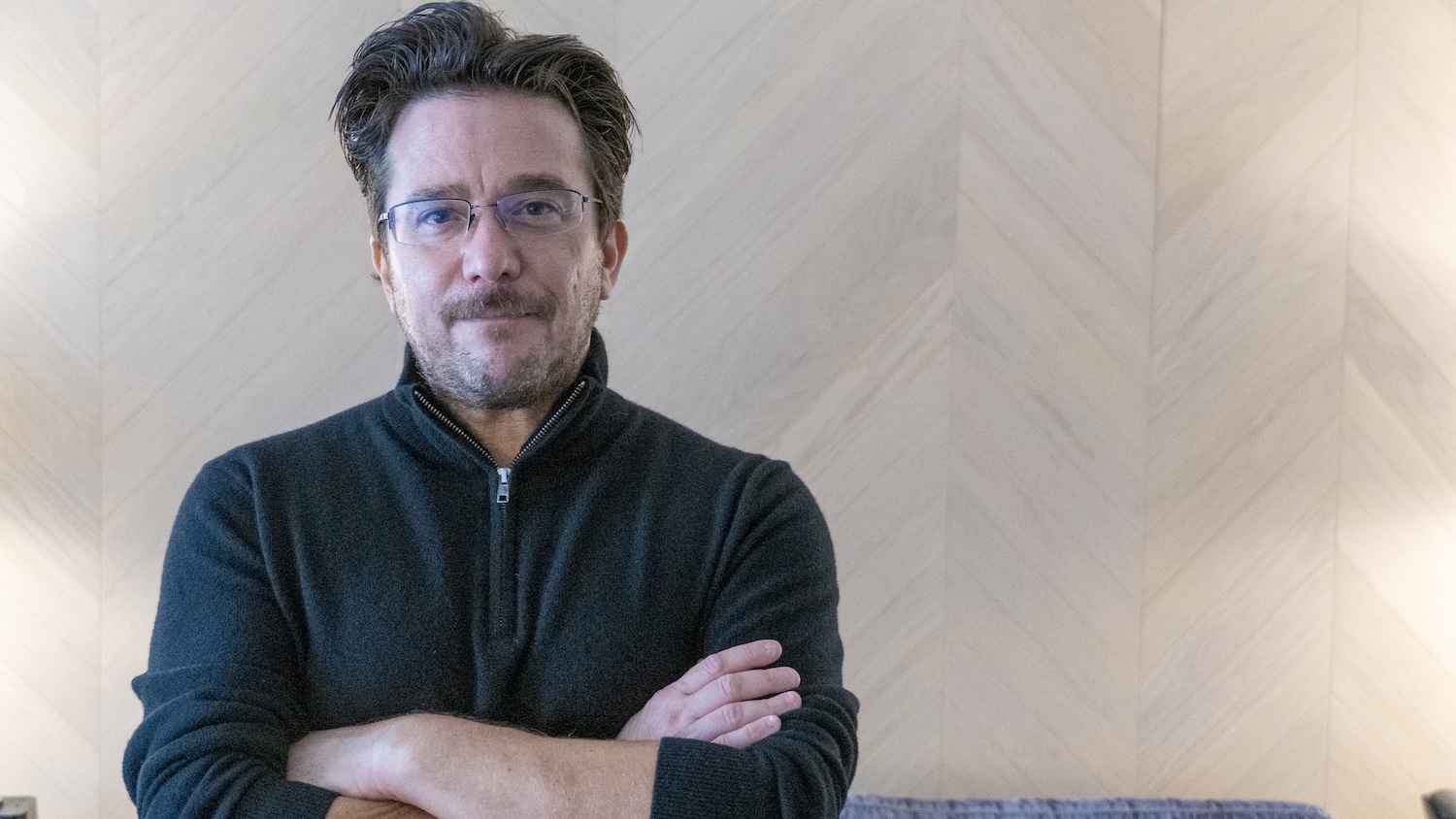
Prolific documentarian Billy Corben just premiered his latest film, Canceled: The Paula Deen Story, at the 2025 Toronto International Film Festival. It tells the story of the disgraced former TV chef who saw her empire crumble in 2013 over allegations of racism. Prior to that, Deen had also come under criticism for promoting what to some (including the late Anthony Bourdain) was extremely unhealthy cooking, especially since she had for a few years hidden her own Type 2 Diabetes diagnosis. It’s a compelling narrative, made with direct access to not only Deen but her two sons, Bobby and Jamie, with whom she launched her first restaurant and subsequent ventures. At the fest, I had the chance to sit down with Corben for a chat. Here is that interview, edited for length and clarity.
Hammer to Nail: Are you a fan of cooking and/or cooking shows in general, or is it only Paula Deen that interests you?
Billy Corben: I’m a fan of neither, to tell you the truth. I’d never been a Food Network viewer. Nothing personal: I just was not interested in that. And around the time that Paula Deen was coming up in the aughts and the early 2010s, I wasn’t paying any attention whatsoever to her or to a lot of the Food Network celebrities. But I was aware of her in that she had really transcended Food Network fame, that she had penetrated the pop culture’s zeitgeist and was kind of ubiquitous. Paula Deen was unavoidable at that time, so I was aware of her, but I was not a particular fan, nor did I know anything about her.
HtN: So who approached whom to make this documentary? Did this idea come to you? Did someone approach you based on your previous work?
BC: Yeah, I got a call from our executive producer on this project, Matt George, whom I did not know, but he had just finished, at that time, Rob Reiner’s Albert Brooks documentary for HBO, which I loved. It’s one of the few documentaries where my only complaint is it wasn’t long enough, and I loved it. So he was clearly working in this celebrity-biopic kind of space, and I got an email that read, “Are you interested in doing a documentary about a celebrity chef?” That’s all it said. And I was like, “Well, I guess it depends on who the celebrity chef is.” He said, “Paula Deen.” And immediately in my head I’m like, “No.”
We get a lot of these opportunities. We’re lucky enough at this. If you get 25 years into making docs, people reach out with opportunities to make documentaries in various stages of access or financing or whatever. And 99+ percent of them we don’t pursue for any number of reasons: not enough time in the day, no interest on our part. Many times I’ll say, “Hey, I think that there are better filmmakers and storytellers that would be more appropriate for this particular story.” I was intrigued, though; how could you not be?
So, I started doing my own little deep dive and talking to friends and family and people who knew Paula Deen whom I happened to know—just a couple degrees of separation away—and just getting a feel for it. I was really intrigued. What I was most intrigued about were the top three things people remembered when you asked them about Paula Deen. Some people didn’t know anything, and others were like, “I remember racist, N-word, butter.” And then a few people, outliers, who were really familiar with her, knew about the diabetes diagnosis. And a few people mentioned the Anthony Bourdain celebrity beef.
But here was the interesting thing when I dug a little deeper: most people’s impression of the scandal was that Paula Deen had been running around her kitchens with a cleaver dropping N-bombs at her staff. And I’m like, “Well, that’s not what happened.” And it dawned on me that maybe it might be interesting to explore this further.
So I took the trip to Savannah to meet Paula Deen and Jamie Deen and Bobby Deen, and Bobby drove and I sat with them, just the four of us, on what I call the Paula Deen backlot tour of Savannah. And we went to their first little house. It was a two-bedroom, one-bathroom where six people lived and they started their illegal catering business from. We went to the Best Western Hotel where they launched their first brick-and-mortar and then this sad empty shell of a building right on a creek where Uncle Bubba’s restaurant was, which was really the ground zero of the 2013 scandal.

Our Chris Reed and filmmaker Billy Corben
We were auditioning each other, to tell you the truth. And finally I realized that Jamie Deen and Paula Deen are very talkative and very warm and friendly. Bobby Deen, not so much; very quiet. And so we parked and after hours of watching him clench his jaw in the rearview mirror, I asked, “Hey, Bobby, what do you think about this documentary thing? Do you think this is a good idea?” And he just let’s out this sigh. He’d been holding his breath for hours and he says, “Thank you. Finally, somebody asks me.” I guess nobody had asked him his opinion, and he’s like, “No, I don’t.”
And the next 20 minutes in that car were the greatest documentary I never made. Where the hell are the cameras when you need them? (laughs) Bobby is venting. And Paula starts crying and Jamie is just very diplomatic and trying to play referee. And I was like, “Oh, I get it. This isn’t just a celebrity-scandal story and a fun kind of nostalgic archive jaunt through the 2000s and early ‘10s. This is a family.” It’s like the restaurant, The Lady & Sons and how this family survived this scandal. And so that was the moment I was convinced that I wanted to tell this story.
HtN: I assume that you’ve seen the movie Living in Oblivion.
BC: God, yeah.
HtN: So this was your Steve Buscemi moment as Catherine Keener and the actress playing her mom are having that breakthrough.
BC: Oh my God, I love that. I haven’t seen that movie in forever. I think I have it on Blu-ray, too. And I bought the script when it came out. Tom DiCillo, yeah. Oh my God. Probably the reason I haven’t revisited it is even at the time there were too many truths. It’s like American Movie: it hit too close to home.
HtN: Yeah, I was in film school when I saw it, so …
BC: So way too much of ourselves and our experience. Oh my God, dude, I was working on an indie feature at the time where the DP [Director of Photography] was dating the AD [Assistant Director]. It was the same thing. I was like, “This is crazy.” (laughs)
HtN: So one thing I noticed here is that the visual and editing style of this movie feels more restrained than past examples of your work such as Cocaine Cowboys, Screwball, and God Forbid, all of which have a more heightened aesthetic. What motivated your approach to making this film in terms of the decisions you made?
BC: Yeah, it’s a little more subdued. I think that’s right. The answer is not that interesting, unfortunately. I ran out of time, honestly. Thom Powers and the people at TIFF were good enough to invite us again for our third world premiere since 2018, our second in a row, with Men of War last year, which Neon is now distributing starting on the 9th of September. I love coming here and I would never give up an opportunity to world premiere at Toronto. I just love this town. I love the people and I love the festival. And so I was like, “Oh, shit.” I had to stop working on the movie and start delivering it to the festival. So really, I’ve got to go back and work on the motion graphics, and I certainly feel, based on the feedback, that I want to revisit it.
For Men of War, the version getting released now is very different from the version that played last year. It’s not so much a totally different movie, but it is a different cut and a different score and a lot of different things. So I think I definitely plan on revisiting this after the festival. I don’t think it will change so dramatically that you’ll be like, “Oh, this is a different film.”
But I just thought that this was going to be about this family and the other people that we interviewed telling their truth, and I was going to kind of stay out of the way of that. I always say, “I’m here to serve the story.” And so every documentary is different. Every documentary requires a different aesthetic or different B-roll style or motion graphics, and they don’t all get 8-year-old kids lip-syncing the interview subject. They don’t all deserve that. (laughs)
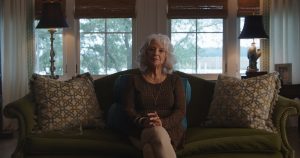
Paula Deen in CANCELED: THE PAULA DEEN STORY
HtN: So you talked about that scene in the car with Bobby. I’m curious, since the film covers a lot of fraught subject matter, what was your approach, other than letting Bobby vent in the car, to put them at ease that you were going to treat them with the respect that they felt they deserved?
BC: I don’t know that I cared about putting them at ease. When I say that, I mean not out of disrespect, but because I was going to ask tough questions about a very difficult time in their lives, which is what I do really in all our documentaries. That’s the thing at rakontur: we do a lot of rise-and-fall stories and a lot of these stories of hustlers and schemers and dreamers and the American-dream-by-any-means-necessary. And the Deen family didn’t strike me as being all that far from that. They’re not cocaine smugglers or PED traffickers or whatever, but they didn’t strike me as that far away from what was kind of a classic rakontur character. And so they knew that this was going to be a rags-to-riches-to-pariah story, so they were either in or they weren’t. And I think because Paula was in, you heard the boys, they were like, “If mom’s doing it, then we do this as a unit, as a family.” And so there was very little punch-pulling or kid-gloving or diplomacy. They knew what they were there for and they were ready to sit down and take the licks, I guess.
HtN: Well, speaking of taking the licks, one of the fraught subject matters that you cover, and I think it’s a really interesting part of the film, is that for a lot of white people, being accused of racism is as bad as actual racism. I happen to disagree that those are the same things. Being accused of racism is not the same thing as being a victim of racism. What is your impression of how the Deen family parses that difference? Some of that is in the film already.
BC: I can’t speak for them, obviously, but I can say that I don’t think that they necessarily think of themselves as victims. I think they think of themselves as being very blessed, even in the wake of this scandal that ruined their reputation and maybe not all of their business, but a great deal of them; I mean, you’re talking about nine figures in lifetime earnings that they’re probably out as a result of this. So I don’t think that they think that what they went through or what they were accused of is anything like being a victim of racism.
And I think that we were having an important inflection point at that moment in American history. Someone refers to it in the documentary as a racial reckoning. And I think it was long overdue, and I think that it was necessary. I don’t know that it was always directed productively, but that’s going to happen. I mean, history is littered with people who have suffered as a result of our shifting norms and mores as a society and as a result of human growth, as well. And I think that this may be one of those stories.
And that’s not a question of “Did she deserve it? Did she not deserve it? Did the punishment fit the crime?” I think that’s entirely up to the audience and to the viewer and to everybody who comes to the table with their own life experience and background. But I think that there are people who deserve to get it, and canceling is a cross between accountability and shaming. And so like I said, the ultimate question is, “Did the punishment fit the crime?” And that’s not up to me.
HtN: Speaking of the racial reckoning, I really like Michael Twitty in your film. He’s just so great. How did you approach him to be in the documentary? Obviously he wrote about Paula Deen, but how did you approach him?
BC: My wife is a huge fan of his and had read two of his books. And of course, in the research for the doc, we read his fabulous blog post about it, which was just filled with so much nuance and history. I wish we could have spent 30 minutes talking about just his blog post in the documentary. There was a world in which at one point this was going to be a three-parter where we delved much deeper into some of those pods that are now just pods, but they were much weightier, meatier subjects. To me, he spoke for the food history, the Civil Rights history, the kind of reaction in pop culture and his symbolics-versus-systemics argument, which I found really, really compelling.
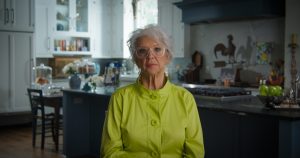
Paula Deen in CANCELED: THE PAULA DEEN STORY
And I don’t think we can talk enough about that, about achieving real meaningful change and growth as a people versus a symbolic sort of head on a stake, if you will. We didn’t get George Zimmerman, but we got Paula Deen. Was that a consolation prize at the moment? And again, your conclusion could be, “Fuck her.” That’s fine, but it’s certainly worth considering. And that’s the thing, too, is I didn’t want the documentary to change anyone’s opinion. I wanted it to help people form an informed opinion. That’s all.
Again, if your conclusion is she’s a racist ghoul, so be it. But at least know what happened, know what the real accusations were and what actually went down. And I think she’s probably the first major-duty celebrity-cancellation of the Twitter era where she kind of got canceled 140 characters at a time. And there wasn’t a lot of nuance. There weren’t a lot of people who knew the story, but a lot of people who read the headlines and the snarky tweets.
And listen, I’m guilty of participating in the Twitter mob, I’m sure, at various times. And I don’t know that I’m entirely sure that my targets were people who deserved to get it, necessarily. You try to punch up as much as possible. But I think that there’s a bit of humanity here, too, not redemption, but just simply knowing that behind the headlines and behind the tweets and behind the funny memes, there may be a human being and their family, and maybe we should, before we click send or post or reply, we should just take a moment to consider that.
HtN: It’s been 12 years since Deen’s empire crumbled. This all happened in 2013. What is it about 2025 that makes this a particularly interesting time for the film to come out?
BC: I cast no judgment on this. I don’t know that I’ve really made up my mind yet. So I don’t know if this is a good thing or a bad thing, but I’m relatively confident that if you took all the same facts that happened in 2013 and they happened today in 2025, that the outcome would not be the same. Meaning that if the Paula Deen scandal, as it were, breaks in 2025, I don’t think the outcome is the same. Again, what that says about us or what that says about this moment, I’m not sure. But I’ve been saying that not all cancellations are created equal. There are people who earned it, people for whom it’s long overdue. And then there are cases where it may say just as much, if not more, about us and the times than it does about the person caught in the crosshairs. And that’s what seemed intriguing to me to revisit now. And also why I say it’s OK if someone draws a different conclusion from somebody else. I think that’s totally fine.
And I also think it’s intriguing when you watch the archive once the scandal breaks. At that point in the movie, this was under the Hubble telescope, this scandal, and we have this woman, this barely high-school-educated woman, born 18 years prior to the Civil Rights Act passage, who in her senior year watched her high school get desegregated and integrated. I don’t say this by way of excuse. I say this by way of all of us have the experience and the perspective of the time and place where we grew up. Hopefully we grow up even better than our time and our place, and we grow to be better, more understanding, empathetic people. But I think it’s something that we hold this woman to a higher standard than we do some of our leaders. We ask her questions about things that I don’t know that she has any business opining on, and let’s be real, this lady, when you ask her to opine on the history of Civil Rights or contemporary race relations in the American South, she’s cringe sometimes in the way grandmas or grandpas might be.
But we also have this worship of rich people in our country where we just ascribe an omnipotence to them like, “Oh, they’re rich. They must know everything about everything.” I know a lot of very rich and successful people who barely know anything about the area in which they became rich and successful in, let alone asking them to opine and give us answers to everything. So, I get it. If you think she’s a racist and she said inappropriate, unforgivable things, that’s fine. But look at Mel Gibson and look at Dog the Bounty Hunter. I call this documentary like a bingo card of canceled—rightfully canceled—people at that. You watch it and you think, “Really? This lady is Public Enemy Number One?”
I think documentaries, when they’re most effective, are the start of a conversation. They’re not the totality of the conversation. You can leave and you can be like, “That was lots of cans of worms. Let’s talk about all this stuff.” And I hope that that’s what this does. I don’t want anybody to leave with just like, “She’s a racist/she’s not a racist,” but let’s talk about all of these issues and everything that happened.
HtN: Thank you so much for talking to me, Billy.
BC: Thank you so much.
– Christopher Llewellyn Reed (@ChrisReedFilm)





